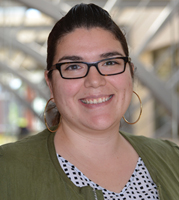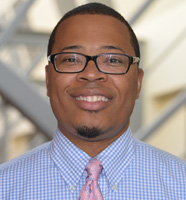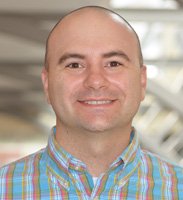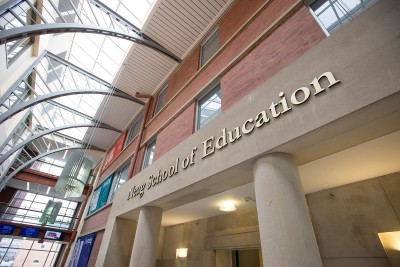The Neag School of Education recently welcomed new faculty members through its continued effort to elevate the academic and research focus and help transform education.
Dr. Noel Card is an associate professor in the Measurement, Evaluation, and Assessment (MEA) Program of Educational Psychology at the Neag School. His methodological interests include meta-analysis, longitudinal data, and dyadic data. His substantive interests center around social development during childhood and adolescence, especially peer relations, aggressive behaviors, and peer victimization. Card’s work has been funded by NIH, NSF, and other agencies, and it has been published in Child Development, Developmental Psychology, Structural Equation Modeling, and in several edited and authored books (e.g., Applied meta-analysis for social science research; Handbook of developmental research methods).
Prior to joining the MEA faculty in 2014, Noel received his Ph.D. in Clinical Psychology from St. John’s University, completed a postdoctoral fellowship in Quantitative Psychology at the University of Kansas, and spent eight years on the faculty of Human Development and Family Studies at the University of Arizona.
 Dr. Erica Fernández is an assistant professor in Educational Leadership at the Neag School. She holds four degrees from Indiana University – Bloomington, including a doctorate in Educational Policy Studies. Her primary research is focused on centering, listening to and sharing the educational engagement experiences of Latin@ immigrant parents, particularly for those living amid threatening and hostile anti-immigrant environments. Critical Race Theory, Latin@ Critical Race Theory, Latin@ Cultural Citizenship and Chicana feminist epistemology theoretically ground her work, while also helping to center the narratives of Latin@ immigrant parents. She hopes that the narratives of Latin@ immigrant parents will help highlight how oppressive institutional policies create barriers for authentic engagement within schools.
Dr. Erica Fernández is an assistant professor in Educational Leadership at the Neag School. She holds four degrees from Indiana University – Bloomington, including a doctorate in Educational Policy Studies. Her primary research is focused on centering, listening to and sharing the educational engagement experiences of Latin@ immigrant parents, particularly for those living amid threatening and hostile anti-immigrant environments. Critical Race Theory, Latin@ Critical Race Theory, Latin@ Cultural Citizenship and Chicana feminist epistemology theoretically ground her work, while also helping to center the narratives of Latin@ immigrant parents. She hopes that the narratives of Latin@ immigrant parents will help highlight how oppressive institutional policies create barriers for authentic engagement within schools.
 Dr. Erik M. Hines is an assistant professor in Educational Psychology at the Neag School. Dr. Hines teaches in the counseling program and prepares graduate students to be professional school counselors. Dr. Hines’s research agenda centers around: (a) African American male academic achievement and college readiness; (b) parental involvement and its impact on academic achievement for students of color; and (c) improving and increasing postsecondary opportunities for first generation, low-income, and students of color (particularly African American males). Additionally, his research interests include career exploration in the fields of Science, Technology, Engineering, and Mathematics (STEM) for students of color in K-12.
Dr. Erik M. Hines is an assistant professor in Educational Psychology at the Neag School. Dr. Hines teaches in the counseling program and prepares graduate students to be professional school counselors. Dr. Hines’s research agenda centers around: (a) African American male academic achievement and college readiness; (b) parental involvement and its impact on academic achievement for students of color; and (c) improving and increasing postsecondary opportunities for first generation, low-income, and students of color (particularly African American males). Additionally, his research interests include career exploration in the fields of Science, Technology, Engineering, and Mathematics (STEM) for students of color in K-12.
Hines has secured research funding to study the college readiness and persistence of African American males to improve their academic and career outcomes. Further, Dr. Hines has worked on several grants aimed at increasing awareness of STEM careers for students of color and rural students. His research has appeared in peer-reviewed journals, such as the Journal of Counseling and Development, Professional School Counseling, and The High School Journal. Dr. Hines received his Ph.D. from the University of Maryland, College Park in Counselor Education with a concentration in Urban School Counseling. Finally, he has worked as a counselor in various K-12 settings and for the Ronald E McNair Post-Baccalaureate Achievement Program.
 Dr. Devin Kearns is an assistant professor of Special Education in the Neag School and a research scientist for the Center for Behavioral Education & Research (CBER) at the Neag School. He received his Ph.D. at Vanderbilt University in Nashville, Tennessee. Kearns has seven years of classroom experience, working in elementary education as a general-education teacher, literacy coach, and reading specialist. He has also provided professional development and done curriculum design for the National Center on Intensive Intervention, the University of California, Los Angeles, Vanderbilt University, the University of Oregon, the University of Texas, the national teacher program Teach For America, and independent charter school networks. Devin has worked with large and small school districts in urban and rural areas in all regions of the United States and with multiple school boards in Canada.
Dr. Devin Kearns is an assistant professor of Special Education in the Neag School and a research scientist for the Center for Behavioral Education & Research (CBER) at the Neag School. He received his Ph.D. at Vanderbilt University in Nashville, Tennessee. Kearns has seven years of classroom experience, working in elementary education as a general-education teacher, literacy coach, and reading specialist. He has also provided professional development and done curriculum design for the National Center on Intensive Intervention, the University of California, Los Angeles, Vanderbilt University, the University of Oregon, the University of Texas, the national teacher program Teach For America, and independent charter school networks. Devin has worked with large and small school districts in urban and rural areas in all regions of the United States and with multiple school boards in Canada.
Kearns’ research focuses on the development of word recognition in children with or at-risk for reading disability. His latest research has focused on how children read polysyllabic words, that is, words with more than one syllable. Older struggling readers have a particularly difficult time with these words, and it is not clear why or how best to help these students. He has conducted research to understand what these words are so difficult and to test interventions to address these issues. In his previous work at Vanderbilt, he worked on large-scale implementation of Peer-Assisted Learning Strategies and developed a beginning reading intervention for first graders.
 Dr. Mark Kohan is a teacher educator and assistant clinical professor in the Neag School. Before coming to UConn, Dr. Kohan helped create the Center for Hope & Justice Education at the University of Cincinnati where he served as its director. His work there included grassroots youth and community organizing to support improved schooling, teaching, and teacher education. He worked closely with area schools as well as community and cultural organizations, such as The National Underground Railroad Freedom Center, The Center for Holocaust & Humanity Education, and the Cincinnati Reds Urban Youth Academy, to create new educational supports for students and teachers in the region.
Dr. Mark Kohan is a teacher educator and assistant clinical professor in the Neag School. Before coming to UConn, Dr. Kohan helped create the Center for Hope & Justice Education at the University of Cincinnati where he served as its director. His work there included grassroots youth and community organizing to support improved schooling, teaching, and teacher education. He worked closely with area schools as well as community and cultural organizations, such as The National Underground Railroad Freedom Center, The Center for Holocaust & Humanity Education, and the Cincinnati Reds Urban Youth Academy, to create new educational supports for students and teachers in the region.
His teaching career began as a high school English language arts teacher at a public alternative school in West Virginia. Those experiences, coupled with transformative professional development fellowships with Freedom Writers Institute and the National Writing Project, drive him to develop more inquiry-based and culturally-responsive educational partnerships that support community development and educational change.
 Jennifer “Jen” Michno is the clinical instructor and coordinator of the University of Connecticut Administrator Preparation Program (UCAPP) Residency in the Neag School of Education. In that role, she’s overseeing the design and coordination of a residency model Principal Preparation Program to train emerging leaders to assume leadership roles in lower-performing “Alliance Districts” in CT. This work is the cumulative effort of the CT State Department of Education, Neag School of Education and LEAD CT partners, with a focus on strengthening the instruction in all CT schools.
Jennifer “Jen” Michno is the clinical instructor and coordinator of the University of Connecticut Administrator Preparation Program (UCAPP) Residency in the Neag School of Education. In that role, she’s overseeing the design and coordination of a residency model Principal Preparation Program to train emerging leaders to assume leadership roles in lower-performing “Alliance Districts” in CT. This work is the cumulative effort of the CT State Department of Education, Neag School of Education and LEAD CT partners, with a focus on strengthening the instruction in all CT schools.
Prior to joining UConn, she was a principal at Elizabeth Green Elementary School in Newington and both an educational administrator and psychologist at the Capital Region Education Council. Jen Michno is currently in the Ed.D. program at the Neag School of Education. She also has a CT 093 Superintendent Certificate, from UConn; a CT 092, Educational Leadership Certificate from UConn; and a Sixth-Year Certificate in school psychology from the University of Hartford.

 Facebook
Facebook Twitter
Twitter  LinkedIn
LinkedIn
very impressive crew!!!turns out prof. Card is my new neighbor—great guy, lovely family—wish you would reconsider my suggestion to have session for retired faculty featuring brief descriptions of on-going research and/or other projects—have you seen ads in ny times for “one day university?”—could be a model—would be happy to discuss further if any interest—vin rogers
Thanks for your kind words, Vin. Dean Schwab appreciates your suggestion and thinks a half day in the spring may work. He also wants to make sure you’re aware of our Neag 15th Anniversary Celebration on Oct. 24 & 25. Invite coming to your mailbox soon.
I think Vince’s idea is a good one. Universities would do well to create environments for retired faculty and alumni to share their projects and research.